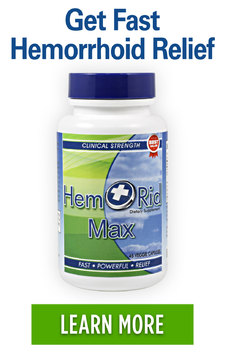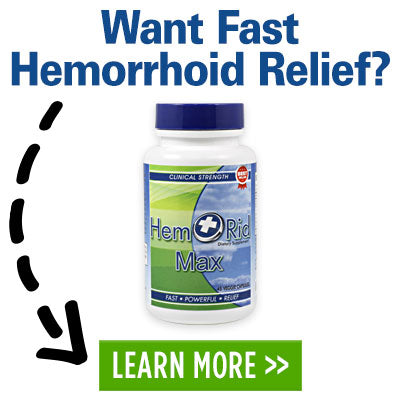Complications of Hemorrhoids Surgery: Internal, External, Prolapsed and More
Posted on 30 April 2018 by Maryanne Johnson
Share this post
Although hemorrhoids are a common issue experienced by about half of Americans, complications can arise in both types when they are not properly treated.
Complications can be especially tricky when hemorrhoid surgery is involved.
External and internal hemorrhoids are equally common in their occurrence, and symptoms are often discomforting while sitting or standing, with bleeding, small bumps around the anus, itching, and irritation frequently felt.
Complications of a Hemorrhoidectomy
A hemorrhoidectomy is a surgery aimed at hemorrhoid removal. This surgery is for those with severe and enlarged hemorrhoids with the risk of rupturing, causing further complications.
It is imperative to keep a close eye on your body post-operation, especially the first ten or so days.
Complications that can occur after a hemorrhoidectomy surgery are:
- Anal fissures, tears in the anal lining
- Fever
- Bleeding excessively
- Discharge of rectal fluid
- Problems and difficulty urinating or defecating
- Excessive swelling in the anal area
- Constipation
These complications can be rare, but if you are experiencing any of them, inform your hemorrhoid doctor because you may require hospitalization.
Don't be afraid of trying a new product for hemorrhoids that works. HemRid is an outstanding product for hemorrhoids that works great.
Complications of a Rubber Band Ligation of Hemorrhoids
This outpatient hemorrhoid treatment is another method of ridding your body of internal hemorrhoids. Rubber band ligation works to stop the flow of blood to the hemorrhoid that is irritated, and the mass will shrink and die within a few day of the bands's application.
Complications that are possible after a rubber band ligation surgery are:
- Infection
- Pain
- Excess bleeding
- Thrombosed hemorrhoids
- Ulcers
Hemorrhoid bleeding and pain are relatively common post ligation surgery, but if you have had this procedure done and found that the site is possibly infected, or there are a presence of ulcers, thrombosed hemorrhoids, and excessive and persistent bleeding, contact your physician immediately.
These complications, although rare, should be taken seriously.
Hemorrhoids are enough of a pain and any complications that may arise should be immediately relayed to a doctor.
Complications that result from cases of hemorrhoids can be rare. Fortunately, for a healthy, normal body, the healing time is relatively fast.
Hemorrhoids are reported to only hang around for a few days and up to a few weeks at most.
Inflamed hemorrhoids shrink, and can shrink faster with proven and effective treatment methods.
Anything to calm the skin that can be applied to external hemorrhoids will help make them shrink faster, whereas, with internal hemorrhoids, a diet of increased fiber will do the trick in keeping your inner rectal lining in its normal condition.
You can also use HemRid Max to help fight the symptoms of your internal and external hemorrhoids.
Complications of Sclerotherapy
Sclerotherapy is a non-operative procedure used in the treatment of hemorrhoids.
Your doctor or a gastroenterologist can perform this treatment method.
Sclerotherapy is used to treat blood vessels and the malformations of blood vessels, such as hemorrhoids.
The procedure consists of medicine being injected into your hemorrhoid, forcing them to shrink and eventually disappear.
This procedure is used to treat chronic internal hemorrhoids and once the chemical is injected, a scar tissue forms, forcing your hemorrhoid to shrink.
Side effects of sclerotherapy include minor discomfort following the procedure and rectal bleeding, and both symptoms will subside on their own.
If you are suffering from constant hemorrhoid flare-ups, your doctor may recommend sclerotherapy.
Sclerotherapy has a high rate of success in treating chronic hemorrhoids. Like rubber band ligation, it is a non-operative procedure with quick recovery time.
Untreated Hemorrhoids
Although hemorrhoids can go away on their own, if you leave them untreated and they become severe, you could be putting yourself at risk for complications.
It is better to try at-home remedies to help subside the symptoms of hemorrhoids.
For untreated hemorrhoids, try:
- A warm sitz bath
- Preparation H cream
- Wipes with ingredients like witch hazel or aloe vera
- Aloe vera
- Hemorrhoid relief supplements
- More fiber in the diet
- Exercise
- Drinking plenty of water
These methods can be tried in the comfort and privacy of your own home to help shrink untreated hemorrhoids.
Using any of these hemorrhoid treatments or remedies on your hemorrhoids can help shrink them faster.
If your hemorrhoids do not go away within a few days, let your doctor know.
Rectal bleeding could be a sign of a disorder other than hemorrhoids, so it is crucial to let your doctor know when you experience this symptom.
While it could be an indication of untreated hemorrhoid, rectal bleeding occurs in many other gastrointestinal conditions.
Chronic Hemorrhoids Complications
The older we get, the more likely it is that we have chronic hemorrhoids. The tissues holding together this cluster of veins and blood vessels weakens with age, making it all the more likely that the hemorrhoids become a chronic condition.
Hemorrhoid inflammation can lead to many uncomfortable symptoms during flare-ups, and the better you get at managing these flare-ups, the lower the risk or reoccurrence.
In managing chronic hemorrhoids, it's best to remember that a change in diet is critical in preventing flare-ups.
If you are experiencing reoccurrences in internal and external hemorrhoids, it is probable that your diet is lacking the necessary amount of fiber or water.
Constipation and chronic hemorrhoids go hand in hand, and both fiber and staying hydrating can help both conditions.
In chronic hemorrhoid management, remember to include these fibrous foods in your diet:
- Fruits
- Vegetables
- Brown rice
- Whole grains
- Legumes
- Nuts
For chronic hemorrhoids, talk to your doctor about other treatment methods you can try to prevent flare-ups.
Your doctor can provide you with options like non-operative procedures if your hemorrhoids are inhibiting your lifestyle.
Infected Hemorrhoids
While a hemorrhoid becoming infected is a possibility, it is usually a rare one. Typically, hemorrhoids cause pain, itching and sometimes bleeding. When an infection takes place, you may notice an abnormal amount of bleeding after a bowel movement.
In some cases, hemorrhoids can become infected.
Infection can occur if an external hemorrhoid becomes thrombosed, meaning if a blood clot forms inside of it.
If the blood clot bursts, an infection can take place.
Thrombosed hemorrhoids can go away by themselves without bursting, but blood clots that do not open up can be incredibly painful and uncomfortable.
If you have external hemorrhoids that have become thrombosed, you may want to talk to your doctor about having them lanced and drained.
By doing so, your doctor can ensure that the thrombosed hemorrhoid does not become infected.
When an internal hemorrhoid prolapses, there is a higher risk of contracting an infection.
An infection is a rare occurrence, and usually, a prolapsed hemorrhoid can be gently pushed back through your anus.
In severe cases of a prolapsed internal hemorrhoid, the onset of infection can happen quickly, and you should seek medical care immediately.
Infections can also occur after hemorrhoid surgeries, but again, this is rare. When side effects of the operation become severe such as a significant amount of bleeding and pain, the chances of an infection are higher.
If you are recovering from hemorrhoid surgery and notice these factors, contact your doctor or emergency services immediately to prevent the onset of an infection.
Complications of Internal Hemorrhoids
Internal hemorrhoids are located on the inside of the rectum, beneath the mucous membrane.
They are veins that aid in the control and release of stools, transportation of blood vessels, and are essential in the functionality of the lower rectum and bowel movements.
The good news is if you suffer from internal hemorrhoids, the only indication of their inflammation and presence is the painless bleeding that occurs after a bowel movement.
A hard stool can tear and disrupt the inner lining of the rectum, causing a tear, and this can result in the hemorrhoids reacting through inflammation.
There are, however, some complications that can arise from internal hemorrhoids. Sometimes, your internal hemorrhoid can become prolapsed or prolonged.
This means that your hemorrhoid will fall through the anal opening. This prolapsed hemorrhoid can cause complications, one of which is the collection of bacteria from stool particles that further induces itching, making the condition much worse.
If you have a prolapsed hemorrhoid, consult your doctor right away.
Complications of External Hemorrhoids
External hemorrhoids take the form of small, rubbery bumps around the anus. The veins underneath the surface of the skin and around the anal opening can become inflamed and irritated, resulting in these bumps.
Complications that come from external hemorrhoids are the formation of potential blood clots, and these are known as thrombosed hemorrhoids.
Try this product for hemorrhoids if you want to stop the bleeding, itching, irritation, and other painful hemorrhoid symptoms.
Blood clots form on the inside of the external hemorrhoid, causing severe and immediate pain.
They appear bluish in color, and more often than not, require lancing and draining.
If you have a blood clot form inside of an external hemorrhoid, tell your doctor, as your doctor may need to perform a removal to prevent further complications.
Infected Hemorrhoid Complications
Hemorrhoids are extremely common and occur in both men and women, equally. Despite this, they can become infected and lead to worse problems. Bleeding and pain are two side effects often experienced by those with infected hemorrhoids, either internal or external.
If your hemorrhoid symptoms get out of line and you are looking to at least temporarily subside the discomfort of hemorrhoids, start with at-home remedies.
A sitz bath or a warm bath for fifteen to twenty minutes, combined with Epsom salt or other healing and soothing essential oils, can offer immense relief to hemorrhoid symptoms.
Pain management can also be found in over the counter medications like Tylenol or Ibuprofen.
These can also be taken safely post hemorrhoid procedure, but to be safe, check with your doctor beforehand.
Severe Cases of Infected Hemorrhoids
For severe and rare cases, the tissue around the anus can die (gangrene). It is important to not allow the infection to become this dangerous.
If you have extreme, unmanageable pain and overly excessive bleeding in your rectal area, let your doctor know immediately.
When complications of hemorrhoids are concerned, it’s crucial to be aware of what is normal and what is not normal for this fairly common condition.
The more informed you are about hemorrhoids, the less risk of having complications that can lead to worse issues.
Complications of Fiber Treatment for Hemorrhoids
Fiber is one of the most important diet changes you can make when it comes to hemorrhoid management.
The daily recommendation of fiber intake for adults is about 20 to 30 grams of fiber.
You can get your fiber from these foods:
- Whole grains
- Fruits and vegetables
- Nuts and legumes
- Brown rice
If you are struggling to reach the recommended amount of fiber in your diet, try taking fiber supplements or fiber gummies.
Fiber supplements are available at local stores in a pill form or powder. Powdered fiber supplements dissolve quickly and often have little to no taste.
You can add fiber to your beverages or even in your meals if you are struggling to include fiber in your diet.
Making substitutions for foods like white bread and rice for foods full of fiber such as whole grains and brown rice can help you meet your daily quota of the recommended 20 to 30 grams of fiber intake.
Fiber makes the stools softer and much more comfortable to pass, relieving problems like constipation and hemorrhoids.






0 comments